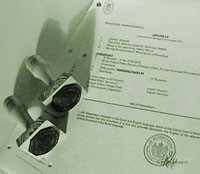Certified translations include a statement, a signature and a stamp by a translator who has been sworn in at the district court. Whenever the following types of documents are required, a certified translation ensures the documents are legally valid in the country where the translation will be used:
- Official documents such as by-laws, court rulings and legal correspondence;
- Marriage certificates, adoption documents, references, diplomas.
If you require a certified translation, please forward a legible copy (or fax, or scan, but no photo) of the original text. Certified translations will always be delivered on paper, since the copy of the source text must be securely attached to the translation. In addition, Bilingo will also send you a scan of all pages of the sworn translation so you have a digital copy before all pages are attached.
Apostille and Authentication
If you need to use the certified document abroad, the translator’s signature may need to be authenticated. Fortunately, most countries have signed the so-called “Apostille Treaty”, and in that case a request for an Apostille at the district court where the translator was sworn will be sufficient. You will have to pay charges to the court for this service. Jolanda Wesenbeek was sworn in at the Breda District Court, but is also registered at the courts of Amsterdam, Arnhem, Den Bosch, Dordrecht, Middelburg, Rotterdam, The Hague and Utrecht.
Please visit the following website for an overview of countries that have signed the Apostille Treaty: http://hcch.e-vision.nl/
Documents that are destined for a country which has not signed the treaty must be authenticated. This means that the document must be approved successively by the district court where the translator was sworn in, the Ministry of Justice and the Ministry of Foreign Affairs. For more information, please visit the website of the Dutch Ministry of Foreign Affairs.



